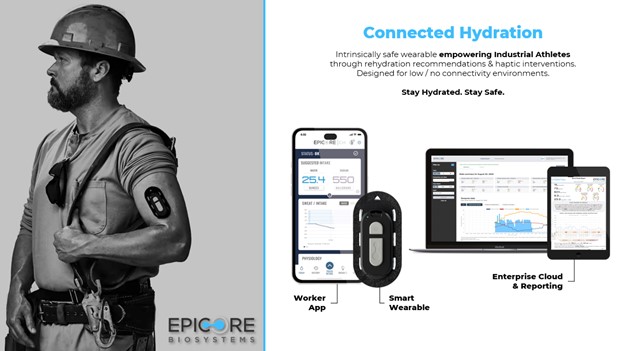Contributor: Epicore Biosystems
Increasing Threat to Worker Safety: Climate change is significantly increasing the risk of heat exposure, putting over 2.4 billion workers at risk of excessive heat exposure during their work, resulting in numerous injuries and fatalities annually.
Economic Impact of Heat: Rising temperatures not only affect worker health but also lead to substantial economic losses. For every 1°C increase, there is a 1% increase in injuries and a 3% reduction in efficiency, translating to significant productivity losses and financial burdens due to heat-related issues.
Wearable Technology: Epicore Biosystems’ Connected Hydration is a cutting-edge wearable system that provides real-time hydration and physiological data, helping workers combat dehydration and heat exposure with personalized feedback and timely alerts.
The Rising Threat of Heat Exposure to Worker Safety
Worker safety is severely threatened due to the increasing risk of heat exposure brought on by climate change. A recent report by the International Labour Organization (ILO), “Ensuring Safety and Health at Work in a Changing Climate,” highlights the alarming impact of climate change on workers’ safety and health globally. The ILO estimates that more than 2.4 billion workers out of a global workforce of 3.4 billion are likely to face excessive heat exposure during their work. Additionally, the report states that 18,970 lives and 2.09 million disability-adjusted life years are lost annually due to the 22.87 million occupational injuries attributable to excessive heat.
Last summer, record-breaking heatwaves and heat-related injuries dominated the news. 2024 could be worse. By 2050, there could be over 50 additional scorching days (exceeding 90°F). According to OSHA’s 2021 findings, this anticipated increase in heat could lead to 450,000 more occupational injuries and a sevenfold rise in heat-related deaths. Public Citizen (2023) suggests that heat-related injuries and fatalities are already underreported by factors as high as 50 and 40 times, respectively.

Economic Impact of Heat
Heat not only affects worker health but also has substantial economic implications. The Atlantic Council (2021) reports that for each 1°C rise in temperature, there is a 3% reduction in efficiency, leading to an estimated $500 billion (about $1,500 per person in the US) in labor productivity losses. A comprehensive study by the RAND Corporation on heat illness prevention in California estimated the economic value of preventing each injury or illness at $770,000 in 2023, highlighting the significant financial burden of heat-related issues.
The Human Body’s Response to Heat
Our bodies have natural biological and physiological responses to heat stress. These include increasing blood flow to the skin and initiating evaporative cooling through sweating. Over time, our bodies adapt to heat stress, becoming more efficient at dissipating heat. This adaptation includes an earlier onset of sweating and improved water and salt regulation.
However, individual responses to heat can vary greatly. Natural heat tolerance, level of heat stress response, current heat acclimation, hydration, fitness, body mass, dietary habits, alcohol consumption, workload strain, personal protective equipment (PPE), and daily temperature and humidity all contribute to this variability.
Research has shown up to tenfold differences in sweat losses among industrial workers during similar work sessions, even under comparable conditions.
Protecting Workers from Heat Stress
For those responsible for protecting heat-exposed workers, it is crucial to identify who is most susceptible to heat stress on any given day and determine the appropriate protective measures. The Gatorade Sports Science Institute recently covered how 35% of American PDO workers experience occupational heat strain symptoms during or after their work shift, and 30% report productivity loss due to these symptoms.
Fortunately, technological advancements are helping to safeguard workers. Heart rate monitors, core temperature monitors, and personal hydration smart wearables provide essential health information, enabling timely intervention and preventive measures.
Epicore Biosystems, a digital health company based in Cambridge, MA, has developed an advanced sweat-sensing wearable system called Connected Hydration empowering workers to proactively combat the harmful effects of dehydration and heat exposure through personalized hydration feedback.

Our Smart Wearable, worn on the arm, wirelessly relays real-time hydration and physiological data to a Mobile Application. Workers receive actionable fluid-electrolyte suggestions in real-time. Vibration alerts and alarms provide workers with instantaneous feedback informing them when to rehydrate and when they are at risk.
Connected Hydration is the first-ever personalized hydration management solution that:
- Monitors sweat fluid and electrolyte loss continuously
- Alerts users at risk of dehydration
- Measures skin temp and activity level
- Equips safety teams with critical insights
The system comprises Smart Wearable, Mobile Application, and Secure Cloud for group/anonymous user data analysis and predictive analytics.
Features include:
- Sweat fluid & electrolyte loss, skin temp, and motion tracking
- Rehydration feedback in real-time
- Vibration lost fluid alerts and dehydration alarms
- 1000+ hours of battery life
- Class 1, Division 2, Groups A, B, C and D, T6
- SOC2 Type II data security
To learn more on how Epicore can help you scientifically evolve your heat stress programs, please stop by the Epicore Biosystems booth, #425, at VPPPA’s 2024 Safety+ Symposium, visit https://www.epicorebiosystems.com/contact or contact sales@epicorebiosystems.com to schedule an introduction meeting.
About Epicore Biosystems
Epicore Biosystems is a digital health company developing advanced sweat-sensing wearable and cloud analytics that provide real-time, personalized health insights for hydration, safety, and wellness. Founded in 2017 as a spinout company from Northwestern University’s Querrey Simpson Institute for Bioelectronics and John Rogers Laboratory, Epicore has partnered with multiple Fortune 500 companies, the Department of Defense, and leading research hospitals to drive personalized hydration and skin care management with wearable microfluidic products. For more information, please visit the Epicore Website.



